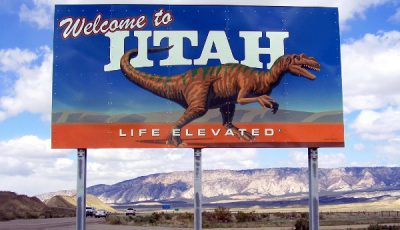Dispatches from Anti-Porn Utah
 SALT LAKE CITY — Where were you when porn was declared a public health crisis by the state of Utah?
SALT LAKE CITY — Where were you when porn was declared a public health crisis by the state of Utah?
I was driving through the city of St. George, with my spouse, on our way to Las Vegas to visit her parents and family. We were stuck listening to conservative talk radio. Nothing else was on, and I needed some stimuli, even if I fundamentally disagree with arguments being made (oh boy, did I).
While listening, the news piped through the radio announcing that former Utah Gov. Gary Herbert, a Republican, signed into law a resolution passed by the state legislature calling pornography a ‘public health hazard.’
I began laughing in the car, instantly thinking: ‘This has to be a joke.’ Clearly, it wasn’t. This was several years ago, in 2016.
Since I’ve long been of the mind that calling things as trivial as porn a “public health crisis” is a blatant misuse of the term and ties up public resources needed to fight the actual instances of public health is threatened.
Fast forward to the present, 2021, and my sentiment is the same. Last month, Rep. Susan Pulsipher (R-South Jordan) reintroduced a bill that would force every new mobile device sold in the state to have porn blocking software. Pulsipher’s bill, House Bill (HB) 72, would mandate porn filters designed by for-profit, faith-based SaaS developers.
Manufacturers, such as Google or Apple, would face civil liability if they fail to comply with the requirements. A user who doesn’t want the filters installed can disable them manually once the phone or mobile device is purchased.
House Bill 72, first off, is a pipe-dream and is virtually impossible to enforce. It emulates a bill that passed the legislature in 2020, which requires adult entertainment websites to place a warning label on their content. Herbert permitted the bill to pass without his signature, empowering the state of Utah to levy financial penalties against non-compliant website operators. Alas, this is virtually impossible to enforce, too. HB 72 luckily died before the state legislature on February 3 when lawmakers declined to take up further action on the bill.
The Salt Lake Tribune reported that Rep. Pulsipher was dealt with a legislative loss and given a reality-check to how internet culture and access are treated and regulated.
At the federal level, the internet is currently perceived as an open ecosystem. Pulsipher’s bill demolishes this sentiment by advocating for technology companies and manufacturers to comply with undue burdens to curtail the so-called public health crisis. One ultra-conservative US state views it as a legitimate threat to the moral and cultural fabric of society.
Pulsipher’s bill, though, is only the tip of the iceberg. Out of every state I’ve covered as a journalist and editorial writer, Utah has proven to be the most obsessed with regulating porn and sexual expression.
Across the state, 62 percent of Utahns are adherents to the Mormon church.
While the number of Mormons is now a minority around Salt Lake City’s metropolitan area, the vast majority of the state is ideologically and spiritually homogeneous. You elevate that spirituality demographic to government representatives, Republican Mormons dominate Utah politics — at the local, state, and federal levels.
Sen. Mitt Romney is Mormon, as is fellow Sen. Mike Lee and Reps. Blake Moore, Chris Stewart, John Curtis, and Clarence “Burgess” Owens — Utah’s entire delegation to the House of Representatives and Senate. In the state legislature, 88 percent of lawmakers identify themselves as Mormons, with most of those individuals caucusing with the supermajority of Republicans in both houses.
It’s not a surprise that most lawmakers in Utah are social conservatives, registered Republicans, and practicing Mormons. However, the issue at hand is the degree to which the obsession with regulating porn and sexual expression is not just a political issue but more or less a characteristic of LDS teachings on sex and consent.
Utah is not a theocracy — a government ruled by a religious organization and hierarchy. The separation of church and state is stratified when personal beliefs cloud the actual discussions of proper governance.
Attempting to control people through the frameworks promoted in HB 72 is immoral, unconstitutional, and un-American.













